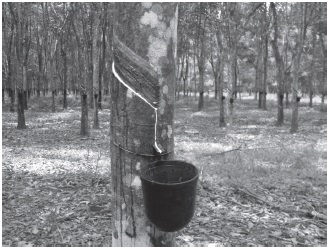Rubber tapping system effect on the productivity of Hevea brasiliensis in the Colombian Middle Magdalena

Abstract
Tapping systems with stimulation are used to minimize costs and improve latex yield. For this, tapping systems with different frequencies and with or without Ethrel® stimulation and fertilizer levels were evaluated in a 9-yearold crop of FX3864 of Hevea brasiliensis in Barrancabermeja, Santander. In this study, a split plot design with randomized complete blocks was used, where the tapping systems with different frequencies with or without stimulation were considered as the principal plot and the fertilization treatments with combined dosages of N, P and K were considered as the subplots. The dry rubber yield, bark consumption, tapping panel dryness incidence, dry rubber content and profitability were considered as response variables. The systems d/3 E and d/4 E obtained the highest yield (1,446 and 1,281 kg ha-1 yr-1, respectively), with significant differences with the systems d/3 S.E and d/5 E. For the fertilization treatments, there were no significant differences. Notwithstanding, the highest yields were obtained in the 40-40-40 kg ha-1 and 80-80-80 kg ha-1 of N, P and K balanced treatments. The higher foliar levels of N, P, K and Ca were founded in the d/4 E system. According to these results, the d/4 E tapping system is recommended to be the most profitable under different tapping yields, with less bark consumption (3.86 cm), longer life plantation (3.85 years) and less disease panel incidence.
Keywords
Ethrel stimulation, Látex, Yield, Panel dryness, Fertilization
References
- Alle, J.Y., E.A. Dick, E.F. Soymahin, R.O. Glaba, J.Z. Keli y S. Obouayeba, S. 2015. Effect of mineral fertilization on agrophysiological parameters and economic viability of clone PB 235 of Hevea brasiliensis in the region of GO in south western Côte d'Ivoire. J. Anim. Plant Sci. 2, 3768-3780.
- Diarrassouba, M., E.F. Soumahin, L.F. Coulibaly, A.E. Badou, K.E. Dick, C. Kouame, S. Obouayeba y S. Ake. 2012. Latex harvesting technologies adapted to clones PB 217 and PR 107 of Hevea brasiliensis Muell. Arg. of the slow metabolism class and to the socio-economic context of Côte d'Ivoire. Int. J. Biosci. 2(12), 125-138.
- Di Rienzo, J.A., F. Casonoves, M.G. Balzarini, L. Gonzalez, M. Tablada y C.W. Robledo. 2015. InfoStat version 2015. Grupo InfoStat, FCA, Universidad Nacional de Córdoba, Córdoba, Argentina.
- Gonçalves, P., S.R. de Souza, A.P. Brioschi, A. Virgens Filho, A. May y R.S. Alarcon. 2000. Efeito da freqüência de sangria e estimulação no desempenho produtivo e econômico de clones de seringueira. Pesqui. Agropecu. Bras. 35(6), 1081-1091. Doi: 10.1590/S0100-204X2000000600003
- Njukeng, J.N., P.M. Muenyi, B.K. Ngane y E.E. Ehabe. 2011. ethephon stimulation and yield response of some hevea clones in the humid forests of southwest Cameroon. Int. J. Agron. Article ID 257340. Doi: 10.1155/2011/257340
- Obouayeba, S., E.F. Soumahin, K.M. Okoma, A.E.B. N'Guessan, R. Lacote, L.F. Coulibaly y S. Aké. 2011. Relationship between the tapping cut length and the parameters of vegetative growth and rubber yield of Hevea brasiliensis, clones GT 1 and PB 235 in south-eastern Côte d'Ivoire. J. Crop Sci. 2(2), 27-44.
- Phakagrong, A., P. Chitprasert, S. Liengprayoon, N. Musigamart y L. Vaysse. 2010. Influence of ethephon stimulation on natural rubber properties. En: Proceedings of the 48th Kasetsart University Annual Conference, 3-5 Feb. Bangkok, Tailandia.
- Rodrigo, V., K. Kudaligama, K. Fernando y P. Yapa. 2011. Harvesting the rubber tree once in four days: a solution to current issues in the rubber industry in Sri Lanka. J. Rubber Res. Inst. Sri Lanka 91, 15-35.
- Silva, J.Q., P. Gonçalves, J.A. Scarpare Filho y R.B. da Costa. 2010. Agronomical performance and profitability of exploitation systems in four rubber tree clones in São Paulo state. Bragantia 69(4), 843-854. Doi: 10.1590/S0006-87052010000400009
- Soumahin, E.F., S. Obouayeba y P.A. Anno. 2009. Low tapping frequency with hormonal stimulation on Hevea brasiliensis clone PB 217 reduces tapping manpower requirement. J. Anim. Plant Sci. 2(3), 109-117.
- Soumahin, E.F., S. Obouayeba, K.E. Dick, D.O. Dogbo y P.A. Anno. 2010. Low intensity tapping systems applied to clone PR 107 of Hevea brasiliensis (Muell. Arg.): Results of 21 years of exploitation in South-eastern Cte dIvoire. Afr. J. Plant Sci. 4(5), 142-150.
- Virgens Filho, A., A. Moreira y P.R. Castro. 2001. Efeito da calagem e adubação da seringueira no estado nutricional e produção de borracha seca. Pesqui. Agropecu. Bras. 36(8), 1019-1026. Doi: 10.1590/S0100-204X2001000800003
- Virgens Filho, A., A. Moreira y P.R. Castro. 2003. Características físicas e químicas do látex e crescimento da seringueira em função da calagem e da adubação NPK em dois sistemas de explotação. Ciênc. Agrotec. 27(6), 1237-1245. Doi: 10.1590/S1413-70542003000600005
